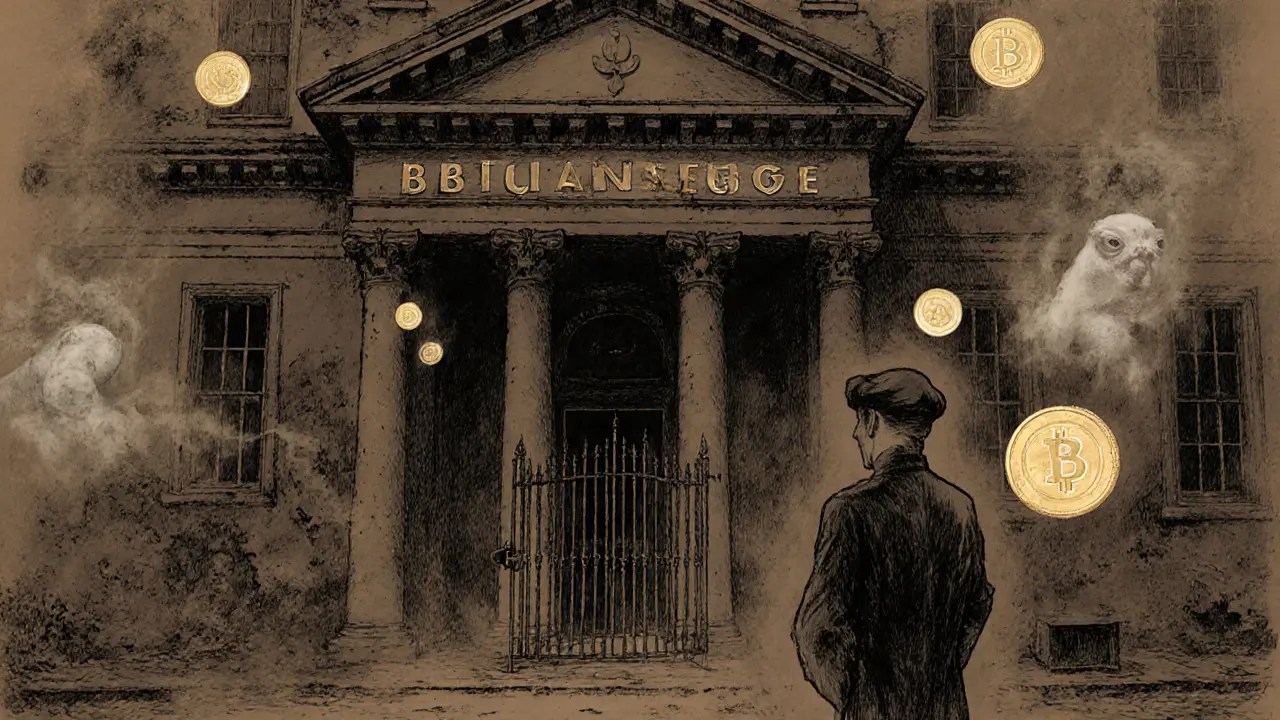Crypto Exchange Risk Assessment Tool
Evaluate Your Exchange's Risk Level
This tool helps you assess the safety of any crypto exchange by analyzing key factors like regulation, security, and transparency. Based on the article's findings about BitAsset, understanding these factors is crucial for protecting your funds.
Risk Factors Assessment
Does the exchange have clear regulatory licensing and compliance documentation?
Does the exchange provide clear information about operations, ownership, and fund security?
Does the exchange provide clear details about security protocols, insurance, and cold storage?
Is there reliable, responsive customer support available?
Can users reliably withdraw their funds without delays or restrictions?
Is there evidence of consistent, reliable operations and no major security incidents?
Key Recommendations:
When you're looking for a crypto exchange, you want three things: security, transparency, and reliability. BitAsset claims to offer all three-but the truth is far more complicated. As of 2025, this platform sits in a gray zone between legitimate trading service and potential scam. If you're considering trading on BitAsset, you need to know what’s real, what’s missing, and what could cost you your money.
What Is BitAsset?
BitAsset presents itself as a cryptocurrency derivatives exchange focused on smart contract-based trading. It targets traders who want leverage on digital assets without holding the actual coins. The platform says it supports 24/7 customer service and offers a range of trading pairs. But here’s the problem: no one seems to agree on what BitAsset actually is. Some sources call it a Hong Kong-based exchange. Others refer to it as a standalone derivatives platform with no clear headquarters. There’s no official corporate registration publicly listed. No clear CEO name. No registered legal entity you can verify. That’s not how real exchanges operate. Even smaller platforms like MEXC or Gate.io publish their legal structure, licensing details, and compliance teams. BitAsset doesn’t.Trading Pairs and Volume: A Shadow of the Past
Back in 2019, BitAsset claimed to hit $1.08 billion in daily trading volume. That number looked impressive-until you checked CoinMarketCap’s historical data. By March 2020, volume had dropped to $290 million. Today, there’s no reliable public data showing current trading activity. No live volume charts. No order book depth. No API endpoints to verify activity. The platform used to list around 105 trading pairs, mostly crypto-to-crypto. But as of 2025, it’s unclear if those pairs still exist. No updated list is published. No new assets have been added in years. That’s a red flag. Active exchanges constantly add new tokens based on demand. BitAsset hasn’t changed in over five years. That’s not innovation-it’s stagnation.Regulatory Status: The Biggest Red Flag
This is the core issue. Legitimate crypto exchanges don’t hide their licenses. Binance has licenses in multiple jurisdictions. KuCoin is registered with FinCEN. Even lesser-known platforms like Bybit and OKX publish their compliance status clearly. BitAsset? Nothing. No license number. No regulatory body name. No audit reports. No KYC/AML policy published. The only clear rule they have is: no users from the United States. That’s not compliance-it’s avoidance. Many offshore platforms ban U.S. users because they can’t meet strict SEC requirements. But they still show their paperwork. BitAsset doesn’t show anything. In 2025, regulators worldwide are cracking down on unlicensed platforms. The EU’s MiCA law, Singapore’s MAS guidelines, and even Hong Kong’s new crypto rules require exchanges to be registered. BitAsset operates in the dark. That makes it a target for enforcement-and a risk for you.
User Reviews: Mixed Signals, Heavy Warnings
User feedback is split, but the warning signs are louder than the praise. Some traders say they made profits and withdrew funds without issues. But those stories are rare. Far more common are reports of:- Withdrawal delays lasting weeks
- Customer support ignoring tickets
- Account freezes without explanation
- Unverified bonus offers that disappear after deposit
Security: No Proof, No Trust
You don’t need to be a tech expert to understand this: if a platform won’t tell you how it protects your funds, you shouldn’t trust it. BitAsset doesn’t publish:- Whether it uses cold storage
- How much of user funds are insured
- Whether it’s had any past hacks
- What encryption or multi-sig protocols it uses
Who Should Avoid BitAsset?
If you’re new to crypto, do not use BitAsset. The lack of transparency makes it impossible to assess risk. Beginners don’t have the experience to spot scams-and BitAsset is designed to look legitimate until it’s too late. Even experienced traders should think twice. Derivatives trading is already high-risk. Adding an unregulated, opaque platform on top of that is like driving a race car with no brakes. One wrong move, and you lose everything. The platform’s silence on regulatory compliance, security, and fund protection makes it incompatible with modern crypto standards. In 2025, the market rewards transparency. BitAsset rewards silence.
Alternatives That Actually Work
If you want to trade crypto derivatives safely, here are three better options:- Bybit - Licensed in Dubai, offers up to 125x leverage, publishes proof-of-reserves, and has 24/7 multilingual support.
- KuCoin - Registered with FINTRAC in Canada, offers 200+ trading pairs, and has a strong track record of withdrawals.
- OKX - Regulated in multiple jurisdictions, includes a built-in wallet, and discloses its security audits publicly.
Final Verdict: Avoid BitAsset
BitAsset isn’t just risky-it’s irresponsible to use in 2025. The platform lacks the basic elements that define a trustworthy crypto exchange: regulation, transparency, security, and accountability. The few positive reviews you’ll find are either outdated, unverified, or likely paid. The cryptocurrency industry has matured. Traders now expect proof, not promises. Platforms that refuse to provide it don’t deserve your capital. If you’re looking to trade derivatives, there are dozens of legitimate, regulated options. Don’t gamble your funds on a ghost platform with no address, no license, and no track record.Frequently Asked Questions
Is BitAsset a scam?
BitAsset isn’t officially labeled a scam by regulators-but it has all the hallmarks of one. No license, no transparency, no security details, and consistent user complaints about withdrawals and support. In crypto, absence of proof is proof of risk. Treat it as a high-risk platform and avoid it unless you’re prepared to lose your funds.
Can I withdraw my funds from BitAsset?
Some users report successful withdrawals, but many others describe delays of weeks or months. There’s no guarantee you’ll get your money out, especially if you deposit during low-liquidity periods. The platform doesn’t publish withdrawal limits or processing times. Treat every deposit as potentially locked.
Does BitAsset offer leverage trading?
Yes, BitAsset claims to offer derivatives trading with leverage, but it doesn’t disclose the maximum leverage available or the margin requirements. Without clear terms, you can’t calculate your risk. That’s a major red flag for any derivatives platform.
Why doesn’t BitAsset accept U.S. users?
BitAsset doesn’t accept U.S. users because it likely doesn’t meet SEC or FinCEN requirements. Many offshore platforms ban U.S. customers to avoid compliance. But unlike legitimate ones, BitAsset doesn’t publish any licensing documents to prove it’s operating legally elsewhere.
Is BitAsset still operational in 2025?
The website is still live, and some users report being able to log in. But there’s no evidence of active development, new features, or updated security measures since 2020. The lack of updates, combined with disappearing trading volume and no regulatory disclosures, suggests the platform is barely maintained-or possibly in decline.

Nadiya Edwards
November 2, 2025 AT 16:16Why do we even let these ghost platforms exist? They prey on people who don’t know any better. I’ve seen folks lose their life savings because they trusted a website that looked nice but had zero legal footprint. It’s not just risky-it’s criminal to let this stuff operate in plain sight.
And don’t get me started on how they target non-US users like they’re somehow less deserving of protection. That’s not a business model-it’s exploitation dressed up as innovation.
Ron Cassel
November 4, 2025 AT 01:36They’re not a scam-they’re a target. The government doesn’t want you trading crypto because they can’t tax it or control it. BitAsset is the only exchange that doesn’t kiss the Fed’s ring. Every ‘red flag’ you listed? That’s just them refusing to be part of the surveillance state.
Real freedom means no KYC, no licenses, no paperwork. If you’re scared of that, maybe you’re not ready for crypto at all. The system hates transparency because it can’t manipulate what it can’t track.
Malinda Black
November 5, 2025 AT 22:36I just want to say-this review is exactly the kind of clear, calm, and thorough breakdown that new traders need.
So many people jump into crypto because they saw a meme or a YouTube ad, and they have no idea what to look for. This isn’t about fearmongering-it’s about giving people the tools to protect themselves. If you’re thinking about using BitAsset, please, please read this again. Then walk away.
You’ll thank yourself later.
ISAH Isah
November 6, 2025 AT 01:51BitAsset may be shadowy but at least it doesnt pretend to be something it is not
other exchanges lie through their teeth about security and compliance while quietly selling your data to third parties
you think Binance is safe? They are owned by a shell corporation registered in the Caymans with ties to a Chinese state entity
you are being manipulated by the illusion of legitimacy
Chris Strife
November 7, 2025 AT 23:38Mehak Sharma
November 9, 2025 AT 22:38Let me tell you something-I’ve been trading since 2017 and seen more platforms rise and vanish than I can count.
BitAsset? It’s the digital equivalent of a boarded-up gas station with flickering neon that still claims it’s open for business. The silence speaks louder than any whitepaper ever could.
Real platforms don’t hide. They broadcast. They publish. They audit. They answer. BitAsset? It’s a silent film with no credits. And you know what happens to silent films? They rot in the vault.
Don’t be the one who finds out too late that the projector stopped working.
bob marley
November 11, 2025 AT 13:42Oh wow. A 2000-word essay on why a website you don’t like is bad. Groundbreaking.
Meanwhile, the real scam is paying $1000 for a ‘security audit’ from some guy in Estonia who sends you a PDF with 3 bullet points and a watermark.
Bybit? KuCoin? They’re all owned by the same 3 guys in Dubai with 12 offshore shells. The only difference is they spent $50k on a fancy website and hired a PR firm.
Don’t be fooled by the branding. The game hasn’t changed. It’s all smoke and mirrors. Just pick the one with the prettiest lights.
Jeremy Jaramillo
November 11, 2025 AT 19:47This is one of the most balanced, factual, and necessary breakdowns I’ve read on crypto exchanges in years.
I’ve had friends lose everything on platforms that looked just like BitAsset-clean UI, flashy ads, promises of ‘high leverage’ and ‘no KYC.’
But the moment they tried to withdraw? Silence. Ghosted. Account frozen.
People need to hear this. Not just the warning-but the alternatives. Thank you for listing Bybit, KuCoin, OKX. Those are the real ones. The ones that show their work.
Don’t gamble with your future. Choose transparency.
Sammy Krigs
November 12, 2025 AT 02:46Bruce Bynum
November 13, 2025 AT 16:27Brett Benton
November 14, 2025 AT 18:37Man I came here thinking I’d find some insider tip on how to profit from BitAsset.
Now I’m just glad I didn’t deposit a dime.
This review didn’t just warn me-it saved me. I’ve seen friends get wiped out by platforms that looked just as legit. The silence here? That’s not a feature. That’s a funeral bell.
Thanks for naming real alternatives. I’m switching to Bybit tomorrow. No more guessing games.
DeeDee Kallam
November 15, 2025 AT 21:01i kno its sketchy but i made 3k in 2 weeks on bitasset and i just kept reinvesting
everyone says its a scam but i keep getting payouts
maybe its just the ones who lose are the ones yelling the loudest?
im not saying its safe but i dont think its a total scam either
maybe its just… unpolished?
Elizabeth Melendez
November 16, 2025 AT 03:57Okay I just want to say I’m so glad someone finally put this all together in one place.
I spent weeks researching BitAsset before I even thought about depositing-checking forums, Reddit threads, even digging through Wayback Machine snapshots of their site. The more I looked, the more the pieces didn’t fit.
They used to have a ‘Team’ page with photos and names. Now it’s just a single blurry image of a building in Hong Kong with no caption.
And their Twitter? Last post was in 2021. Their Discord? 500 members, 3 active. One guy keeps saying ‘trust the process’ and links to a Telegram group that asks for your seed phrase.
I didn’t deposit. I shared this post with my cousin who was about to put in $10k. She canceled it. We both cried from relief.
Thank you for writing this. It’s not just a review-it’s a lifeline.
Phil Higgins
November 18, 2025 AT 02:21Let’s not pretend this is about regulation alone.
This is about integrity. A platform that refuses to disclose its ownership, its security, its compliance-is not a business. It’s a shell. And shells are built to collapse.
The fact that people still argue ‘but I got my money out’ is the saddest part. That’s like saying ‘I survived the sinking ship, so it must’ve been fine.’
Survival isn’t proof of safety. It’s luck.
And in crypto, luck runs out faster than your margin.
Genevieve Rachal
November 18, 2025 AT 18:52Wow. Another ‘crypto expert’ writing a 10-page essay on why something is bad.
Let me guess-you also think Bitcoin is a pyramid scheme and NFTs are for idiots?
BitAsset doesn’t need to publish audits because it doesn’t care about your opinion. It cares about traders who want leverage without bureaucracy.
You want transparency? Pay $10k for a license and get your name on a government form. Meanwhile, real traders are making money on platforms you’d never understand.
Stop pretending your moral high ground protects your portfolio. It doesn’t. It just makes you slower.
Eli PINEDA
November 19, 2025 AT 17:09Debby Ananda
November 20, 2025 AT 08:55Oh honey. You think BitAsset is sketchy?
Have you seen the ‘proof of reserves’ on the big exchanges? They’re just screenshots of wallets with 0.0001 BTC in them.
They all lie. They all hide. They all have offshore shell companies.
BitAsset is just the one that doesn’t bother pretending to be a bank.
At least it’s honest about being a casino.
And if you’re going to gamble, go for the one with the better odds. Not the one with the fanciest brochure.
Vicki Fletcher
November 20, 2025 AT 21:54Thank you for writing this-so clearly, so thoroughly, so calmly.
I’ve been trying to explain to my sister why she shouldn’t use BitAsset, but I kept getting lost in the details.
You’ve summarized everything I’ve been trying to say: no license, no security disclosures, no updates, no real volume, no verified reviews.
And you gave her alternatives that are actually trustworthy.
I printed this out and gave it to her. She’s now using KuCoin and says she feels ‘peaceful’ about trading for the first time.
This isn’t just information. It’s emotional safety.
naveen kumar
November 21, 2025 AT 21:53BitAsset operates in a legal gray zone because it refuses to bow to colonial financial control
Western regulators demand KYC because they want to track your spending habits
BitAsset offers freedom from that
you call it a scam
I call it resistance